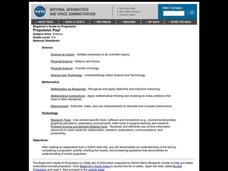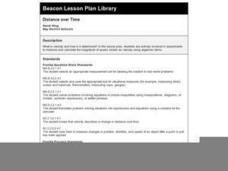Curated OER
Bloodstain Pattern Simulations: A Physical Analysis
Learners receive bloodstain pattern evidence from a crime scene. They answer a series of questions through inquiry, observation, measurement, and analysis. Pupils complete this challenge, by reconstructing the evidence through four...
Curated OER
Nature of Game Balls
Fourth graders see how, when balls are dropped from the same height, mass and size affects the motion of the balls.
Curated OER
Perceived Overweight and Actual Weight Risk Classification
Students calculate their BMI and compare it to a healthy weight chart. In this health lesson, students compare the perception of overweight with healthy weight charts. Students interpret collected data and evaluate their own weight...
Curated OER
Aqueduct Architecture: Moving Water to the Masses in Ancient Rome
Ninth graders compare ancient and modern technology in water transporting. In this lesson on the evolution of the aqueduct, 9th graders build a working aqueduct model and examine its components. They explain the importance and use of the...
Curated OER
Acceleration of Gravity with Pendulums
Students explore, analyze and study to see whether the length of a pendulum affects its period and whether the mass of a pendulum affects its period. They review and discuss a lengthy list of math definitions and experiment with tables...
Curated OER
Everybody Needs a Rock
Students describe and classify rocks that they have chosen. They estimate and find the mass of their rocks.
Curated OER
Pacing a Gunther Chain
Students pace a Gunther Chain, a measurement used by foresters to determine distance and area. They discuss that pacing is individualized depending on age, gender, etc. They practice to find an average pace. Teams estimate, pace and...
Curated OER
Toboggan Science
Students conduct toboggan time trials to investigate the variables that have the greatest effect on toboggan speed. In small groups, they develop a hypothesis to test and perform three trials on the toboggan run for each variable.
Curated OER
Forces and Motion
Students are able to analyze gravity as an universal force. They are able to demonstrate ways that simple machines can change force. Students are able to determine how the force of friction retards motion. They are able to describe...
Curated OER
The Learning Tower of Straws Challenge
Learners construct a tower as high as possible that can successfully lean without collaspling. They examine the effect that lowering an object's center of gravity has on the torque produced on an object.
Curated OER
Asphalt Lab
Learners are introduced to basic engineering principles, road construction and material science. They explore how material properties and strength can be affected. Students become Civil Engineers by both creating Asphalt cookies and by...
Curated OER
Everybody Needs a Rock
Here is a lesson that rocks! Young scientists choose a rock and list words that describe it. They estimate the mass of their rocks and rank them within a group. They measure their rocks for volume and write a story that somehow includes...
Curated OER
Worms And More
Learners complete five center activities that in order to determine the attributes of length and area. They study the vocabulary associated with measurement of length and area. They use blocks, play dough, wrapping paper, and footprints...
Curated OER
Pop Rocket - Trash to Treasure
First off, Newton's laws of motion aren't often taught at 2nd grade, so this lesson plan may be more appropriate for upper elementary learners. It begins with a discussion and demonstration of the laws of motion, and then has individuals...
Curated OER
A Line Drive
Eleventh graders create a 100 year timeline centering on the life of their research subject and place them in the context of local and national history.
Curated OER
In-Line Inertia
Students practice calculating the moment of inertia when discussing a skater and the position in which it is best to spin. After class discussion, students practice calculating inertia on their own.
Curated OER
Propulsion Pop!
Young scholars demonstrate an understanding of the text by completing a propulsion activity, charting the results, and answering questions that demonstrate an understanding of rocket propulsion.
Curated OER
Traveling Bowls
Students investigate the relationship between force and motion while conducting an experiment to answer the question,"How do objects move?". In small groups, they predict how many washers are needed to pull a bowl across a finish line.
Curated OER
Exploring Pendulums
Students observe the movement of pendulums, they begin to understand the relationship between gravitational forces and the mass of objects, the changes in speed and direction of objects, and the distance between objects. They understand...
Curated OER
The Average Atom - Isotopes
Seventh graders, in groups, complete an Isotopes model and notice that atomic masses are decimal numbers. These masses are an average of all the isotopes of that element.
Curated OER
Distance over Time
Students analyze velocity and how it is determined. They experiment with velocity in order to measure and calculate the magnitude of speed. They use examples in their novel "Skateboard Renegade" to relate velocity to real life situations.
Curated OER
Density Destiny
Sixth graders measure and investigate the densities of several objects. They, in teams, determine the mass and volume of each of the 5 objects and record the measurements in the data table.
Curated OER
Geometry: Practical Applications of the Distance Formula
Students, working independently and in groups, apply the distance formula to practical situations. After solving various problems, students in pairs design coordinate planes from the school blue print to measure the distance from the...
Curated OER
Puzzling Perimeters
Third graders use estimation, fractions and decimals to determine the perimeter of objects in the classroom. They are given a worksheet with a list of the items on it. The worksheet has columns beside each of the items for estimation and...























